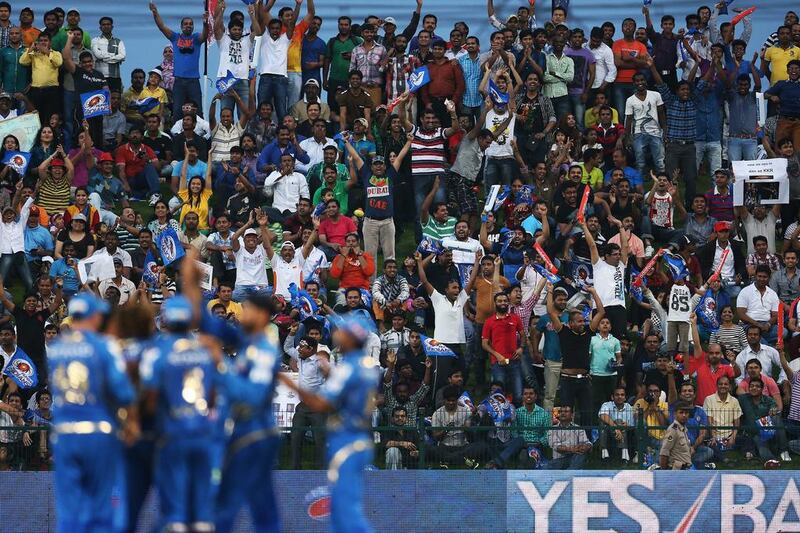At about 5pm on Airport Road on Wednesday there was a traffic jam leading up to the exit that eventually winds its way to the Zayed Cricket Stadium.
The cause was a traffic accident but that was just an inconvenience for those who were part of an unusually large but enthusiastic migration to the stadium.
The crowd was pouring in to watch the much-anticipated first match of the Indian Premier League’s (IPL) seventh season played in Abu Dhabi.
People had apparently been queuing up at the online ticket collection booths since midday and by 3.30pm there was a large crowd already arrived at the venue, despite gates not officially opening until 4.30pm and the match not beginning until two hours later.
This was a situation unprecedented at a cricket match in the UAE – it could be argued that big crowds rarely attend any sporting events in the capital, with the exception of the Formula One.
There have been good cricket crowds before even at Zayed stadium where Pakistan have drawn near-full houses for some of their limited overs commitments.
But it is difficult to recall a house that looked this full, not even for those Pakistan-India ODIs in 2006.
Seeing it was one thing, however, to feel it was another thing entirely.
As the Kolkata Knight Riders and Mumbai Indians prepared to do battle there was an irrepressible din and vim of humanity within the stadium.
Those blasted horns were suddenly louder than any have sounded at this stadium before, as was the music between deliveries and overs. The electronic boundary-side hoardings were new and there were even fireworks.
Together it did the unthinkable and drowned out the considerable boom of Ravi Shastri on the microphone at the toss.
It did not seem to matter as Kolkata began their innings that there was only one boundary and a solitary six in the first six Powerplay overs. That had almost nothing to do with the constancy of the crowd’s energy.
It was as if Pakistan were playing with 11 Shahid Afridis in their side (had he been present, the stadium would have burst at its seams).
The whole effect was just somehow glitzier than any cricket match that had been here before, as if it was the final of a major tournament, except one that might happen everyday.
More hype, more noise, more energy, more boundaries, more sixes, more international-quality talent, more of everything: this then is what the IPL is and to witness it first-hand for the first time is to witness afresh the force of cricket, but especially Indian cricket.
It could potentially be a significant moment for cricket in the UAE. There will be a financial windfall to add to those from the UAE team’s twin world cup qualifications.
More money and, crucially, more India in the future now that they seem amenable again to being here. That establishes a particularly lucrative and potentially game-changing cycle.
The attention this tournament gathers can help raise the status of the game. Already Sheikh Nahyan bin Mubarak, Minister for Culture, Youth and Community Development and head of the Emirates Cricket Board (ECB), has said the UAE is more than happy to host the beginning of every IPL season here. Patently, they can.
This is, of course, both the blessing and curse of the IPL.
It is wonderful to see and know that cricket can be this hip and inclusive, but it is a blinding power and it drowns out everything around it that may not be so shiny.
That is not being curmudgeonly – it is necessary. On Wednesday morning, for instance, the recently and temporarily deposed head of the Board of Control for Cricket in India (BCCI) N Srinivasan was told by India's Supreme Court that he cannot yet be reinstated.
He was told that his is one of 13 names in a sealed envelope that is being held by the commission that is investigating the spot-fixing scandal from last season that refuses to go away.
Twelve allegations with annexures have been directed at him, in relation to the franchise that he owns, Chennai Super Kings.
That is a serious matter. But in the words of Justice AK Patnaik from Wednesday’s hearings, “it seems that Mr Srinivasan has not taken the allegations seriously”.
By Wednesday evening, as Jacques Kallis was converting a very slow start into something altogether more explosive, more intrinsically IPL-ian, it barely seemed to matter. Nobody, not just Srinivasan, seemed to be taking it very seriously.
If it left a slightly lemony, bitter aftertaste to a sugary spectacle, then that too is often the way of the IPL.
osamiuddin@thenational.ae
Follow our sports coverage on Twitter @SprtNationalUAE





